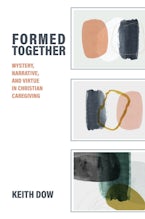If relationships are central to human identity, then the care we give and receive in countless ways throughout life has a moral character shaping the way we give account of ourselves and others. This book helps us to understand why. Drawing from his encounters with people with intellectual disabilities as a direct support professional, Keith Dow investigates an array of philosophical, theological, and biblical resources to offer an insightful account of Christian care and its moral formation. The result is a rich understanding of care as a calling that invites readers to honor mystery at the heart of relation with God and others, and in so doing, move beyond problematic notions of care with regard to disability. The book adds substantively to conversations around theology and disability and should be read by all Christians invested in care.
~Thomas Reynolds, Associate Professor of Theology at Emmanuel College, Toronto School of Theology, University of Toronto
With great skill Keith Dow unpacks the apparently unproblematic notion of giving an account of caring for dependent people, like caring for persons with intellectual disabilities. Against the background of current demands on service organizations to account for the quality of their services, Dow shows the implausibility of giving an account that separates ways of providing care from the beliefs and motivations that inspire professionals who actually do care. In view of the agility with which the author switches between philosophical and theological arguments, this book is highly recommended for Christian readers working in environments that demand compliance with formal rules and requirements without any interests in what is actually motivating them in persisting in their often-difficult jobs.
~Hans Reinders, Professor Emeritus of Ethics, VU University, Amsterdam
Formed Together is a dynamic evolutionary journey of Judeo-Christian theology and the implications of how people with disabilities are perceived and treated in modern society. Based on Dow’s moving experiences, first as a personal care professional and then as a leader in a Christian disability service agency, Formed Together describes an important shift in recognizing the humanity of individuals living with a disability. Dow provides a path for support systems and agencies to acknowledge and support an individual’s spiritual needs as well as religious affiliation. This book affirms human spirituality and its expression by people living with disabilities and offers a pathway to creating communities where all people feel they belong and are valued.
~Shelly Christensen, author of From Longing to Belonging: A Practical Guide to Including People with Disabilities and Mental Health Conditions and founder of Jewish Disability Awareness, Acceptance and Inclusion Month
As a theologian, pastor, and a professional caregiver for people with developmental and intellectual disabilities, I was delighted to find a framework for faith-based caregiving in this book. Words such as 'calling,' 'virtue,' 'neighbor,' 'love,' 'friendship,' 'mutuality,' 'divinity,' 'mercy,' 'grace,' 'humility,' and 'forgiveness' are abundantly used in theology but seldom used in professional caregiving. Keith Dow has combined the work of direct support professionals with the language of imago Dei, the image of God. The concepts in this book are applicable beyond the world of ID/DD and have a place in the wider conversation of, 'Who is my neighbor?' and how Christians should develop relationships with their neighbors. I recommend this book for human service agency recruiters, trainers, and frontline workers.
~Lida Merrill, Director of Faith Community Inclusion, Heritage Christian Services, Inc.
How to resist such a powerful, consumerist, ableist throwaway culture in this context? Enter Keith Dow and his new book Formed Together: Mystery, Narrative, and Virtue in Christian Caregiving. In a brilliant mix of rigorous academic arguments and references to his experience as a caregiver himself, Dow’s book builds on the one concept that can hold together the radical equality of all human beings, including profoundly disabled human beings: the imago Dei.
~Charles Camosy, Studies in Christian Ethics

